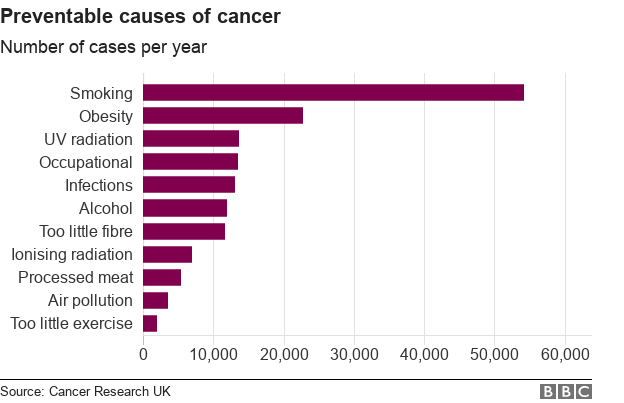Cancer Research UK found more than a third of all cases of cancer were avoidable - some 135,000. The charity also found that excess weight now caused 6.3% of all cancer cases - up from 5.5% in 2011 - while smoking as a cause had declined. It said more action was needed to tackle the "health threat" of obesity. Cancer Research UK found the country with the greatest proportion of preventable causes of cancer was Scotland with 41.5%, followed by Northern Ireland on 38%, Wales on 37.8%, and England on 37.3%.

Drinking alcohol was estimated to have caused 3.3% of cancers in the UK
Across the UK, smoking remained by far the leading cause of preventable cancer, although it dropped from 19.4% in 2011 to 15.1%. Second was being overweight or obese, and third was exposure to UV radiation from the sun and sunbeds. The standard way of diagnosing if someone is obese is by calculating their body mass index (BMI). It measures whether you're a healthy weight for your height. A BMI of more than 25 means you're overweight and a BMI of more than 30 means you're classified as obese, although there are some exceptions.
'I felt responsible'
Janet Boak, from Carlisle, was diagnosed with womb cancer at 51, after she noticed spots of blood four years after her menopause. She had a full hysterectomy, which successfully removed the cancer. It was during a subsequent check-up that she was told being obese had contributed to her risk of getting cancer. At the time, she was nearly 20 stone. "I felt like I was responsible for my own downfall," Janet, 55, said. "It stuck in my gut a bit, thinking I could maybe not have been in this position had I sorted my lifestyle out."

Janet Boak was told being obese contributed to her risk of getting cancer
Janet, a grandmother, has since lost nearly seven stone after she cut down on sugar, started cooking healthier meals from fresh ingredients and became more active. Cancer Research UK found overexposure to UV radiation caused about 13,600 cases of melanoma skin cancer a year - or 3.8% of all cancer cases. Other preventable causes of cancer included drinking alcohol and eating too little fibre, it said. However, overall the analysis found the proportion of preventable cases of cancer had fallen - from 42.7% in 2011 to 37.7%.
Cancer Research UK said the figures showed smoking prevention strategies were working, but more work was needed to tackle the growing problem of obesity. Prof Linda Bauld, Cancer Research UK's prevention expert, said: "Obesity is a huge health threat right now, and it will only get worse if nothing is done. "The UK government must build on the successes of smoking prevention to reduce the number of weight-related cancers. "Banning junk food TV adverts before the 21:00 GMT watershed is an important part of the comprehensive approach needed."

Prof Mel Greaves, a cancer biologist at the Institute of Cancer Research, in London, said the study was an "endorsement" of the idea that many cancers were potentially preventable. But he said the idea that obesity itself or eating too little fibre "causes" cancer was "somewhat simplistic" and still needed to be explored further. "If obesity could be avoided, the impact on cancer rates is uncertain - but they would almost certainly decline significantly," Prof Greaves said. "Given the currently high rates of obesity in young people, this represents (like cigarette smoking) a major societal challenge beyond the bounds of the medical arena."
http://www.bbc.com/news/health-43502144


 The Science, Health, and Technology Room
The Science, Health, and Technology Room


 Reply With Quote
Reply With Quote




